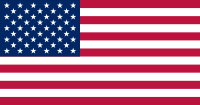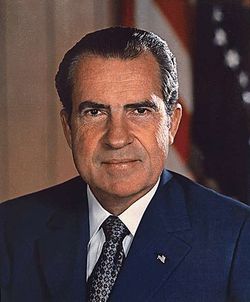Nixon Doctrine
The Nixon Doctrine (also known as the Guam Doctrine) was put forth in a press conference in Guam on July 25, 1969 by U.S. President Richard Nixon. He stated that the United States henceforth expected its allies to take care of their own military defense, but that the U.S. would aid in defense as requested. The Doctrine argued for the pursuit of peace through a partnership with American allies.
In Nixon's own words (Address to the Nation on the War in Vietnam November 3, 1969):[1]
- First, the United States will keep all of its treaty commitments.
- Second, we shall provide a shield if a nuclear power threatens the freedom of a nation allied with us or of a nation whose survival we consider vital to our security.
- Third, in cases involving other types of aggression, we shall furnish military and economic assistance when requested in accordance with our treaty commitments. But we shall look to the nation directly threatened to assume the primary responsibility of providing the manpower for its defense.
The doctrine was also applied by the Nixon administration in the Persian Gulf region, with military aid to Iran and Saudi Arabia.[2] According to author Michael Klare,[3] application of the Nixon Doctrine "opened the floodgates" of U.S. military aid to allies in the Persian Gulf, and helped set the stage for the Carter Doctrine and for the subsequent direct U.S. military involvement of the Gulf War and the Iraq War.
Doctrine In Practice
Both Nixonians and Contrarians argue that the Guam Doctrine may have masked other needs, intentions, and motives. Nixon was president when a resolution of the Vietnam War was essentially mandatory due to growing public opinion in favor of withdrawal;[4] A Gallup poll in May showed 56% of the public believed sending troops to Vietnam was a mistake. Of those over 50, 61% expressed that belief, compared to 49% of those between 21 and 29, even if tacit abandonment of the SEATO Treaty was ultimately required, resulting in a complete communist takeover of South Vietnam despite previous US guarantees.[5]
US retreat from unconditional defense guarantees to lesser allies in general was driven as much by financial concerns[6] as by policy re-examination of strategic and foreign policy objectives, reflected in Nixon's goals of detente and nuclear arms control with the Soviet Union, and establishment of formal diplomatic relations with Communist China. As a consequence of this shift, direct sales of weaponry[7] to nations no longer under the nuclear umbrella of previous US security guarantees dramatically increased as US guarantees were withdrawn.
References
- ↑ Richard M. Nixon (November 3, 1969). "President Nixon's Speech on "Vietnamization"" (reprint). http://vietnam.vassar.edu/doc14.html.
- ↑ Beinart, Peter (2007-01-04). "Return of the Nixon Doctrine". TIME. http://www.time.com/time/magazine/article/0,9171,1574151,00.html?iid=sphere-inline-bottom.
- ↑ author of Blood and Oil: The Dangers and Consequences of America's Growing Petroleum Dependency (New York: Henry Holt, 2004)
- ↑ http://people-press.org/commentary/?analysisid=57
- ↑ Todd, Olivier. Cruel April: The Fall of Saigon. W.W. Norton & Company, 1990. (originally published in 1987 in French)
- ↑ [The Gold Battles Within the Cold War: American Monetary Policy and the Defense of Europe, 1960-1963. Francis J. Gavin, University of Texas at Austin]
- ↑ [Resource: Stockholm International Peace Research Institute: http://www.sipri.org/contents/armstrad/at_db.html]
Further reading
- J. Kimball (2006). "The Nixon Doctrine: A Saga of Misunderstanding". Presidential Studies Quarterly 36 (1): 59–74. doi:10.1111/j.1741-5705.2006.00287.x.
- H. Meiertöns (2010): The Doctrines of US Security Policy — An Evaluation under International Law, Cambridge University Press, ISBN 9780521766487.
|
Links to related articles |
|
|
Richard Nixon |
|
| Life and politics |
Birthplace and boyhood home · Checkers speech · Kitchen Debate · Nixon Presidential library · Nixon Center · "La Casa Pacifica" · Death and funeral
|
|
|
| Presidency |
|
|
| Popular culture |
Nixon mask · Nixon · Frost/Nixon · "Nixon in China" · Nixon in film and TV
|
|
| Books |
Six Crises · RN: The Memoirs of Richard Nixon (autobiography) · No More Vietnams · Biographical works
|
|
| Elections |
|
|
| Family |
|
|
|
|
|
| Participants and notable figures ANZUS · NATO · Non-Aligned Movement · SEATO · Warsaw Pact |
|
| 1940s |
|
|
| 1950s |
|
|
| 1960s |
|
|
| 1970s |
|
|
| 1980s |
|
|
| 1990s |
Democratic Revolution in Mongolia · Breakup of Yugoslavia · Dissolution of the Soviet Union · Dissolution of Czechoslovakia |
|
| See also |
Soviet and Russian espionage in U.S. · Soviet Union – United States relations · NATO–Russia relations · US–Soviet summits
|
|
| Organizations |
|
|
| Races |
|
|
| Ideologies |
|
|
| Propaganda |
|
|
| Foreign policy |
Truman Doctrine · Marshall Plan · Containment · Eisenhower Doctrine · Domino theory · Kennedy Doctrine · Peaceful coexistence · Ostpolitik · Johnson Doctrine · Brezhnev Doctrine · Nixon Doctrine · Ulbricht Doctrine · Carter Doctrine · Reagan Doctrine · Rollback
|
|
| Timeline of events · Portal · Category |
|
 Foreign relations of the United States Foreign relations of the United States |
|
|
Bilateral relations |
|
| Africa |
Algeria · Angola · Benin · Botswana · Burkina Faso · Burundi · Cameroon · Cape Verde · Central African Republic · Chad · Comoros · Democratic Republic of the Congo · Republic of the Congo · Côte d'Ivoire (Ivory Coast) · Djibouti · Egypt · Equatorial Guinea · Eritrea · Ethiopia · Gabon · The Gambia · Ghana · Guinea · Guinea-Bissau · Kenya · Lesotho · Liberia · Libya · Madagascar · Malawi · Mali · Mauritania · Mauritius · Morocco · Mozambique · Namibia · Niger · Nigeria · Rwanda · São Tomé and Príncipe · Senegal · Seychelles · Sierra Leone · Somalia · South Africa · Sudan · Swaziland · Tanzania · Togo · Tunisia · Uganda · Zambia · Zimbabwe
|
|
| Asia |
| Middle East |
Bahrain · Egypt · Iran · Iraq · Israel · Jordan · Kuwait · Lebanon · Oman · Qatar · Saudi Arabia · Syria · United Arab Emirates · Yemen |
|
| Elsewhere |
Afghanistan · Bangladesh · Bhutan · Brunei · Burma · Cambodia · People's Republic of China (Hong Kong · Macau) · East Timor · India · Indonesia · Japan · Kazakhstan · Kyrgyzstan · Laos · Malaysia · Maldives · Mongolia · Nepal · North Korea · Pakistan · Philippines · Russia · Singapore · Sri Lanka · South Korea · Republic of China (Taiwan) · Tajikistan · Thailand · Turkmenistan · Uzbekistan · Vietnam
|
|
|
| Europe |
Albania · Andorra · Armenia · Austria · Azerbaijan · Belarus · Belgium · Bosnia and Herzegovina · Bulgaria · Croatia · Cyprus · Czech Republic · Denmark · Estonia · Finland · France · Georgia · Germany · Greece · Hungary · Iceland · Ireland · Italy · Kosovo · Latvia · Liechtenstein · Lithuania · Luxembourg · Macedonia · Malta · Moldova · Monaco · Montenegro · Netherlands · Norway · Poland · Portugal · Romania · Russia · San Marino · Serbia · Slovakia · Slovenia · Spain · Sweden · Switzerland · Turkey · Ukraine · United Kingdom · Vatican City
|
|
| North America |
| Caribbean |
Antigua and Barbuda · Aruba · Bahamas · Barbados · Bermuda · Cayman Islands · Cuba · Curaçao · Dominica · Dominican Republic · Grenada · Haiti · Jamaica · St. Kitts and Nevis · St. Lucia · St. Vincent and the Grenadines · Sint Maarten · Trinidad and Tobago |
|
| Elsewhere |
Belize · Canada · Costa Rica · El Salvador · Guatemala · Honduras · Mexico · Nicaragua · Panama
|
|
|
| Oceania |
| ANZUS |
Australia · New Zealand
|
|
| Elsewhere |
Fiji · Kiribati · Marshall Islands · Micronesia · Nauru · Palau · Papua New Guinea · Samoa · Solomon Islands · Tonga · Tuvalu · Vanuatu
|
|
|
| South America |
Argentina · Bolivia · Brazil · Chile · Colombia · Ecuador · Guyana · Paraguay · Peru · Suriname · Uruguay · Venezuela
|
|
| Former states |
Kingdom of Hawaii · Netherlands Antilles · Russian Empire · Soviet Union
|
|
|
 |
|
|
Multilateral relations |
|
|
Arab League · European Union · Latin America · Africa · United Nations · Third Border Initiative · International organizations
|
|
|
|
Doctrines, policies, concepts |
|
Presidential
doctrines |
Proclamation of Neutrality · Monroe · Roosevelt Corollary · Good Neighbor Policy · Truman · Eisenhower · Kennedy · Johnson · Nixon · Carter · Reagan · Clinton · Bush · Obama |
|
| Other doctrines |
Lodge Corollary · Stimson · Kirkpatrick · Weinberger · Powell · Rumsfeld · Wolfowitz
|
|
Policies and
concepts |
|
|
|
|
|
|

